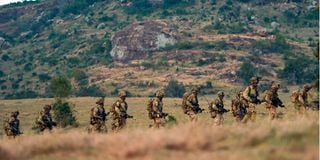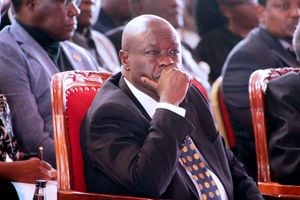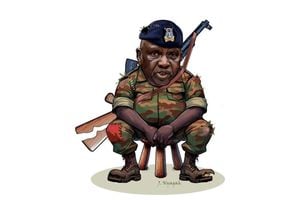Why NGO wants strict rules for British soldiers training in Kenya

Soldiers troop during a simulated military excercise of the British Army Training Unit in Kenya (BATUK) together with the Kenya Defence Forces (KDF) at the ol-Daiga ranch, high on Kenya’s Laikipia plateau on March 26, 2018.
A Non-Governmental Organisation (NGO) has urged Parliament to come up with more strict regulations governing the operations of the British soldiers training in Kenya.
The Africa Centre for Corrective and Preventive Action told the National Assembly Committee on Defence, Intelligence and Foreign Relations that the British soldiers training in the country have got away many atrocities due to weak clauses in the Defence Cooperation Agreement.
The organisation told MPs that the unchecked operations of the UK soldiers have left many Kenyans with unresolved issues resulting from the actions of the soldiers.
It complained that communities around Laikipia where the training takes place have been left with more pain due to the impunity of the soldiers.
In its presentation to the committee that is conducting an inquiry over the conduct of British Army Training Unit Kenya (Batuk) following allegations of corruption, fraud, discrimination, and abuse of power by the British soldiers, the NGO said it is time MPs save Kenyans from crimes committed by the soldiers.
Through its chairman James Mugambi and lawyer Kelvin Kubai, the organisation proposed a raft of changes it wants effected in the deal between Kenya and UK in order to safeguard the rights of Kenyans.
The organisation wants MPs to invoke section 26:4 of the Defense Corporation agreement to allow for a mechanism through which local communities aggrieved by the actions of the soldiers can be compensated.
“This can be an areas claims office outside the walls of the barracks to make it accessible to the victims to register their claims as practised in Cyprus where British Army conduct similar training,” Mr Kubai told MPs.
The organisation also wants the UK to disclose to the local authorities, including the National Environment Management Authority (Nema), county government of Laikipia, on the nature of effects of ammunition used in training to the environment and immediate communities.
Further, they want the training done outside conservancies in well-demarcated, fenced and gazetted community-owned ranges to allow the local communities to directly benefit from the investment.
Environmental protection
The British soldiers should also incorporate a carbon offset programme and take responsibility of all the effects caused by the emissions resulting from the training.
Mr Mugambi told the committee that there should also be full disclosure on the type of equipment the UK ships in the country for the training of its soldiers.
“The UK has a special landing bay at our airport, we don’t know what they are bringing in our country, we should create conditions in our borders so that we know the kind of ammunition getting into our country,” Mr Mugambi said.
He spelled the need for the UK to set a clear plan for disposing of the waste materials emanating from the training.
“There is over 40 tonnes of waste materials emanating from training of these soldiers. We need to know how and where they are disposed of,” Mr Mugambi said.
The committee chaired by Belgut MP Nelson Koech is conducting an inquiry into the conduct of the British soldiers following allegations of corruption, fraud, discrimination, and abuse of power.
The committee is also looking into issues of mistreatment, torture, unlawful detention, killings or any other violations of the internationally recognised human rights standards.
The lawmakers are also assessing Batuk’s operational integrity, especially safety protocols, compliance with legal requirements and adherence to established military standards.
Kenya has a pact with the UK under the Defence Co-operation Agreement (DCA) which allows UK troops to train at Nanyuki, where the Batuk is located.
Since its opening in 2016, over 2,000 military and police from 22 countries have been trained in CIED skills and 40 CIED instructors developed, significantly improving the ability of African Union (AU) forces to operate effectively in high-threat environments, including against Al Shabaab.
In the 12th Parliament, the renewal of the pact was delayed by an allegation of gross human rights violations by British troops, including the death of Agnes Wanjiru. However, the 13th Parliament later ratified the pact.
The cooperation agreement between the two countries allows their militaries to share expertise, experience and techniques, making both forces more effective.





